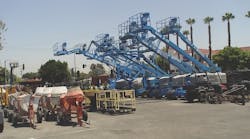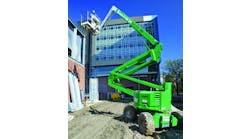This month’s profile of American Rentals in Long Beach, Calif., is an interesting look at the difficulties of obtaining property for a rental center in a dense metropolitan area and then having to conform to LEED – Leadership in Energy and Environmental Design – specifications. Tony Murray knew nothing about LEED requirements and processes and discovered that the city government couldn’t tell him much either.
Probably some of you are likely to dismiss this as something that would only happen in California. Yes, we certainly have that reputation in my home state, but when doing some research into LEED requirements I came upon a list of cities requiring LEED certification on certain size buildings and of the 28 cities listed, only six are in California. And while a few of the cities on the list are places with reputations as “liberal” havens -- such as Berkeley, Calif., Austin, Texas, and Boulder, Colo. -- others, such as Atlanta, Dallas, Houston, Omaha and Phoenix wouldn’t fall in that classification at all.
Hertz Equipment Rental Corp., Holt Cat and Kobelco, among others, are constructing buildings that will conform to LEED specifications, but American Rentals – correct me if I’m wrong – may be the first LEED-certified rental center.
The point I’m making here is that no matter what part of the country you live in, environmental consciousness and regulations such as LEED are taking hold and will sooner or later be coming your way and it’s to your benefit to be aware of them. Just as the deterioration of air quality made the EPA regulations that led to Tier 1, 2, 3 and 4 inevitable, the need to curb waste and create sustainable resource environments are unavoidable as well for reasons I needn’t explain. Because so many cities are requiring LEED certification on buildings of a certain size, it’s pretty crazy that Murray and branch manager Hugo Nunez had to stay up half the night repeatedly to figure out how to do it, but their dedication to the process was exceptional and admirable.
If you aren’t being required to be LEED certified, I can imagine you have enough to keep you busy as owning a rental business will inevitably have you working long hours. But in the event LEED requirements come your way, it would do you some good to be at least a little prepared, so take a look at the cover story and see what American Rentals did to overcome the odds.
It’s also a great rental story of what determination can do to succeed in the face of major challenges.
I first discovered American Rentals earlier this year when I went to a chapter meeting of the California Rental Association and American Rental Association of California. Repeatedly throughout the evening rental people attending the meeting referred to the American Rentals branch as beautiful. It’s not a word I’ve often heard people use in describing a rental center and the pictures in the story probably don’t do it justice. But it was a genuine reaction of respect and appreciation of what Tony, Hugo and the staff of American Rentals did to put this place together.
As we all know, the stock market is fickle. The past couple of months have been tough on the market in general and particularly so on publicly traded rental companies and industry suppliers, and of course this may change by the time this reaches print. In addition to the overall market softness, investors are nervous about low oil prices.
How did United Rentals do in the second quarter? It had record EBITDA, but the stock price has taken a big tumble in the past couple of months. Hertz is straightening out its accounting issues and its equipment rental division has solid new management but its price is tumbling too. H&E Equipment Services and Neff Rentals have solid economic fundamentals but their stock prices are also struggling as are many of the industry’s leading manufacturers. I can go on and on. Investors see low oil prices and make assumptions without understanding the fundamentals of the rental industry.
Take a look at Michael Kneeland’s comments on page 10 of this issue. He points out that the recovery in nonresidential construction, which is the backbone of this industry, is just hitting its stride.
The stock market may not be smart enough to know that the rental industry is also just hitting its stride and is likely to have several growth years ahead. You know it, and your customers know it. It’s not your fault that some investors don’t get it.







